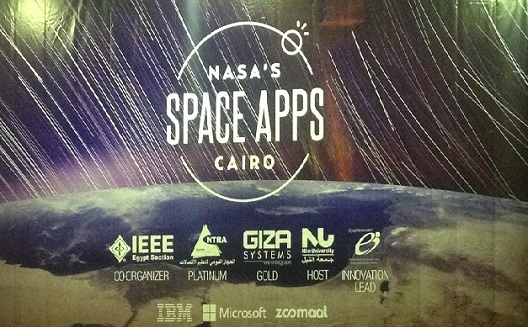NASA hackathon sheds light on Egypt’s growing interest in outer space


The growth of scientific minds in Egypt. (Images via Nasa Space
Apps Cairo)
With so many problems on the ground, why would we want to solve
others in space? This is a question many may ask but not a strange
one for the first Egyptian teams participating in NASA’s Space Apps Challenge
for 2015.
Held in Cairo, and with teams from 135 other countries including the UAE and KSA, Egyptian teams took part in a hackathon with challenges in the areas of robotics, humans, earth, and outer space.
Esraa Abbas, one of the event’s organizers, told Wamda that the fact that Egyptians were competing on an international stage, in the fields of advanced technology, wasn’t just impressive but also important as it could be the beginning of what “will result in future years, of new experiences in unprecedented fields, for future graduates.”
Dr. Tahani Amer and Dr. Farouq El Buzz, two Egyptian scientists working at NASA, opened the hackathon.
Increasing interest in space
The Space Apps Challenge, which has been held annually since 2012, has seen a huge growth in numbers of attendees. This year saw 750 people register on the competition’s website, and of 55 registered teams, 44 participated in the four challenges set by NASA.
Egyptian interest in space is also on the rise. In April, Nile University hosted Dr. Mary Ellen Weber, a former NASA astronaut, to talk with students; and earlier this year Egyptian financial planner Mohammed Sallam was selected as one of the 100 people to be added to the Mars One project list. Eventually 24 will be chosen to make the trip to Mars.
While Egypt’s endeavors to build astronomy education in universities might still be in its infancy, it is developing, something which was emphasized by jury members Ahmed Hatem, software engineer, and Haytham el-Zomor, Assistant Professor at the Higher Institute of Technology.

Some of the event's winners.
The competition
Eighteen projects were developed in the categories of robotics, outer space, humans, and earth. Twenty five mentors and 15 jurors later selected eight winners.
The jury included engineers in various fields, and academics who evaluated the projects according to their functionality, innovation, responsiveness to user input, attractiveness and organization of the user interface.
Mentors included Islam Mustafa, head of IT department at Integreight; Mustafa Khalifa, cofounder of Taarifa, and Samy Amin, teaching assistant at Zewail City of Science and Technology.
Khalifa expressed his admiration for the technical skills of participants given their young age.
Farouq Hassan, head of Startup Grind Cairo and one of the mentors, told Wamda that there is in fact the ability to develop something, in robotics, that could be either be in an incubation program or an accelerator for space-related projects.
This experience was the first of its kind for Egypt and will no doubt be further developed in the coming years, especially with the interest of investors such as Sawari Ventures, which followed the events.

The winning teams included:
Robotics: The four winning teams are seeking to design drones that work in zero gravity. One was the Super Copter project, one of the two projects that reached the finals from the US.
Earth: The winners included FoodEx, a website and app that looks to find solutions to famine and agricultural problems through the collection of data, with an online map to promote education and research.
SkyMeter, a website and Android app that allows users to take images the sky above them, analyze data and save it, all without an internet connection.
Humans: The winner was Mars Scout who developed a 3D game where the player can experience life on Mars and solve problems on the planet, using lava tubes.
Outer Space: PSC-BA CubeSat is the second project from the US to be chosen to participate in the finals in front of scientists from NASA. The project’s goal is to build a small cube-shaped satellite that has all the capabilities of a large satellite, to serve in experiments and research aimed at capturing images of outer space. What’s remarkable here is that the team’s five members are part of a bigger team that is developing the same idea in at Library of Alexandria.
You can learn about the other winning projects here, as well as about the remaining participating projects from Egypt on NASA’s website here.
If you have an inquiring mind when it comes to outer space, NASA publishes downloadable e-books and there are tens of applications that can be downloaded on smartphones, as well as Facebook groups.


